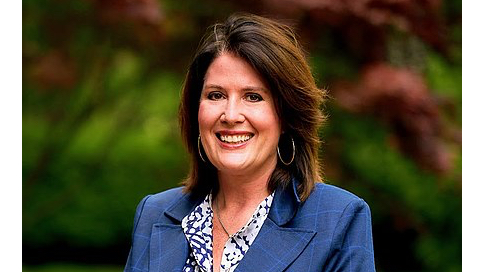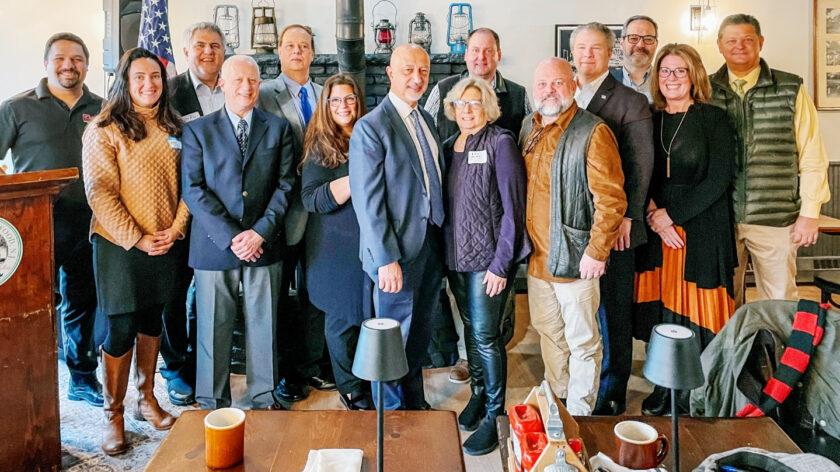
WESTWOOD—Republican State Sen. Holly Schepisi—speaking at the annual Greater Pascack Valley Chamber of Commerce “Breakfast With the Mayors” event on Jan. 24 at The Tavern at the Iron Horse in Westwood—urged the mayors to speak out on “fast-tracked” affordable housing legislation sponsored by Democratic legislators in the Senate and Assembly.
She urged the mayors to “make your voices heard every single day, for the next couple of weeks” on proposed affordable housing legislation (A-4; S-50) that “reforms municipal responsibilities concerning the provision of affordable housing, abolishes the Council on Affordable Housing (COAH), and appropriates $16 million,” states the bill’s heading.
She also discussed liquor license reforms, urging the mayors to speak to municipal clerks and look at every “pocket license” for alcohol in their towns, and any “C” licenses inactive for two years or more, should be able to be sold off at auction for fair market value and add revenue for towns.

And she said that if the assembled mayors know of community projects that need state/federal funding, they should contact her or Fifth District Congressman Josh Gottheimer. “Get it to us sooner rather than later. We need to get that in and start fighting for you tomorrow.”
The mayors or their representatives from all 10 towns in the Greater Pascack Valley are invited to present their annual town updates at the breakfast and field questions from chamber members.
Urging input on affordable housing measure
The affordable housing bill Schepisi (District 39) discussed was introduced by Senate Democrats Troy Singleton (District 7) and Senate President Nicholas Scutari (District 22) in the lame duck session and reintroduced this year. Democrats hold majorities in the state Senate and Assembly.
Schepisi said that she had heard the day before [Jan. 23] that the bill was to be fast-tracked at the state Senate Community and Urban Affairs Committee hearing the next day [Jan. 25]. Schepisi sits on the committee.
That committee heard three hours of testimony on the affordable housing bill Jan. 25, and by a party-line vote, referred it to the Senate Budget and Appropriations Committee. Officials said the referral was due to the bill’s appropriation of $16 million for future implementation.
“Voice your concerns, what’s positive and what’s negative … they’re going to fast-track this through, regardless of whatever unintended consequences may exist,” Schepisi said.
She added, “We should be meeting with mayors, we should be meeting with stakeholders, we should be having a real intense couple of months to come up and fashion what makes sense for this state to be able to afford.”
And she said of overdevelopment, “you have no place for the water to go,” which leads to flooding. She said related flooding impacts residents statewide. “We keep doing things like buying up land, doing studies, and then we buy up here, and you build here, and it’s just a temporary solution and we’re not coming up with long-term types of solutions.”
Schepisi said that proposal, if signed into law, “would redo everything we know about affordable housing and our obligations and it’s going through tomorrow [Jan. 25].”
Schepisi said, “Most of our towns have been proactive, they’ve done what they needed to do, they have satisfied their last [third] round [affordable housing] obligations.”
One of the last towns to settle its third round affordable obligations was Park Ridge. Its borough council and mayor fought a legal battle, costing hundreds of thousands of dollars, with a major developer for nearly five years over the development of the former Sony 30-acre property before ultimately agreeing to settle and allow a 448-unit rental apartment complex, including 68 affordable units.
Most Pascack Valley towns settled affordable housing obligations early—most in 2017 or 2018—though some are only now moving to construct the units due to pandemic interruptions or other factors that delayed completion.”
Schepisi stressed that speakers talking at the affordable housing bill’s hearing would have little time to comment on the complex legislation being advanced.
She also urged mayors to make sure local developments incorporate infrastructure upgrades such as new electrification mandates, new electric vehicle mandates, and new energy master plans, warning that it could cost “hundreds of thousands of dollars” to retrofit new buildings in a couple years if not done during planning and construction.
Schepisi told the mayors that “The issues within our communities are pretty much the same” and all grapple with the impacts on residents and businesses. “And we all try to solve these issues together.”
The state League of Municipalities website notes major provisions of the the new affordable legislation: abolishes COAH; designates the Department of Community Affairs to calculate regional and local affordable obligations based on the 2018 Jacobson Opinion; and each town sets its own affordable obligation number and must adopt that number through a binding resolution. Other legislative details can be found at njlm.org.
In a related appellate court matter, a lawsuit brought by 17 towns—including Montvale—to force Gov. Murphy to make appointments to COAH was declined because the appellate court ruled it lacked the authority to compel the governor to make nominations.
